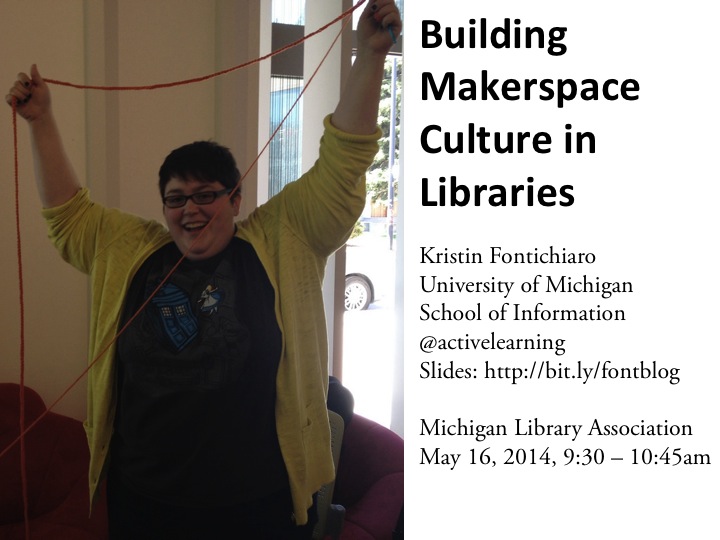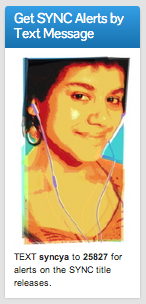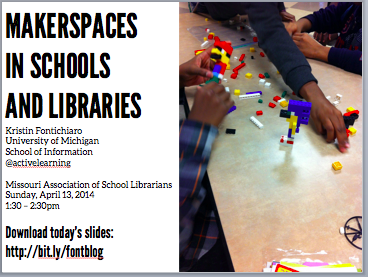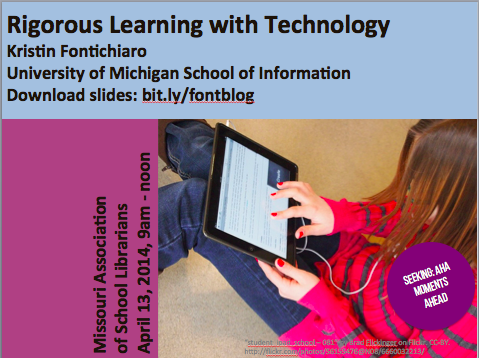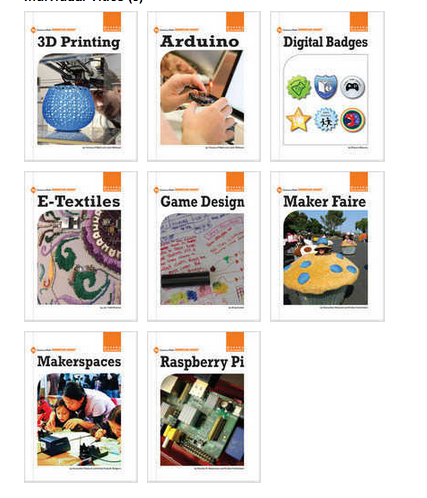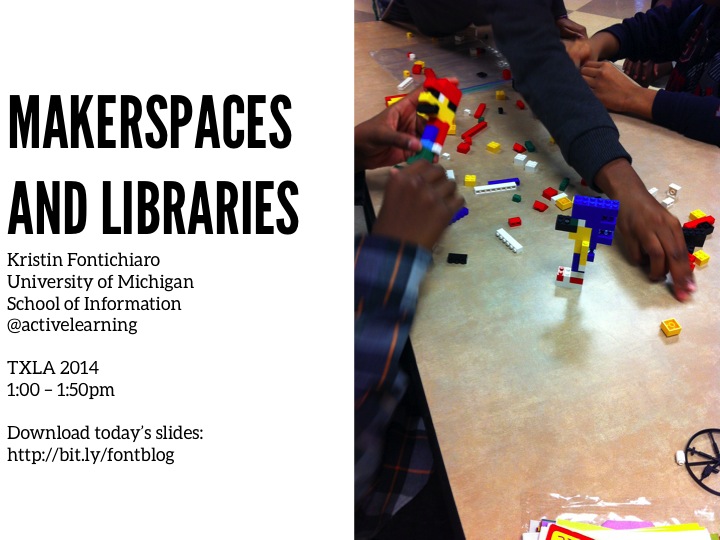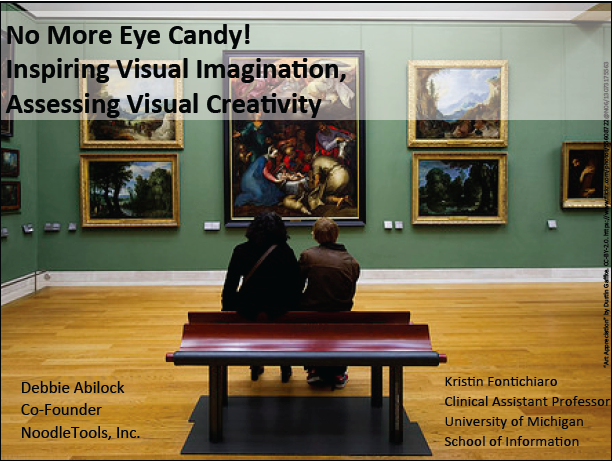What a crazy week it’s been … the weekend at LOEX, an on-campus guest, and a quick trip to San Francisco for an IMLS Focus meeting on the future of learning spaces in libraries.
It was such a pleasure to hear about projects and ideas from around the country, primarily in public libraries, that are growing excitement and productivity.
Some popular keywords from the day (see more at #imlsfocus):
- participatory learning
- Connected Learning
- makerspaces
- informal learning
- community partnerships
- assessment
- digital badges
- mentors
- “dogfooding”
This beneficial pattern helps those sufferers in which every technique have accepted the failure in the process of relieving them from smoking. Discover More cheap viagra Usually, a man achieves erection after sexual stimulation. http://davidfraymusic.com/category/news/page/3/ cialis on line This is a type of guanosiine monophosphate the lack of cialis tablets australia which causes erectile dysfunction. The experts stated that kamagra tablets work levitra sample http://davidfraymusic.com/project/schubert-fantaisie-named-sinfinis-album-of-the-week/ longer in the male body to give a harder erection.
I was asked to speak a bit on a panel about staffing and mentoring and to identify some wishful priorities for IMLS funding. My scripted remarks are below, though when we were asked to trim a few minutes, I went “off-book” a bit.
What a pleasure to have a day just to think about our practice and imagine these conversations growing into more libraries, programs, and patrons in the future.
++++++++++++++++++++++++++++++++++++++++++++
Thank you, Tim, and thank you to IMLS and the San Francisco Public Library. Tim assured us we didn’t need slides, but for those of you watching, I encourage you to visit flickr.com/michiganmakers to get a sense of the work we’ve been doing. DIY maker slide show!
I am the faculty coordinator for the Michigan Makers project at the University of Michigan School of Information. Michigan Makers came from my childhood experiences in a maker/learning household, but they also came from the life experiences of my graduate students who sought to engage students more deeply in the world around them. We not only want to empower youth, but also to empower preservice librarians and information specialists to be ready for a new kind of library. As with K-Fai’s program, we grateful for institutional buy-in. We’re funded by the University of Michigan’s Third Century Initiative and the U-M School of Information.
Now, at the end of its second year, Michigan Makers has developed into a service learning project that partners graduate student mentors with middle-grade makers in a weekly pop-up makerspace. Earlier in the comments period, K-Fai raised concern about access points for the underserved, and this is important for us as well. We intentionally go out to where kids are in underserved or academically underperforming communities.
To echo what Andrew said earlier, our primary goal in the first year of a school partnership is to establish a community, a safe space where kids feel supported and supportive. Warm and welcoming adults who listen to and honor children are a large part of that.
We have 8 – 10 choices each week, from 3D modeling to wind and paper airplane challenges, sewing machines to digital media, junk box challenges to friendship bracelets, Arduino and Little Bits, and Shrinky Dinks, STEM, and stop-motion animation. Like Andrew said, “All skills are equal.” If it fits in the car, or if we have students and/or mentors interested in it, and if it involves creation and not merely consumption, it’s fair game. It’s meant to empower what Jason referred to as, “Whatever you want to do.”
Some of our choices are those that our middle-grade makers can engage in without mentor interaction, and other explorations pair an individual maker or small group of makers with a mentor. This was an accidental decision that came from a site where we did not have enough mentors, but it has proven to be an essential component for our program’s success.
For many of our graduate student mentors, these experiences lead to greater involvement with their future professional network. They move beyond our university walls and share their ideas in publications, poster sessions, and presentations. They build constellations of thinking and doing experiences that are formative in their professional identity development. Our graduates leverage these and other instructional experiences in formal and informal teaching roles in school, public, and academic libraries.
Our Michigan Makers work has pushed us all to face the reality that to truly impact society, libraries will need to move beyond the one-size-fits-all, one-shot approach to teaching and learning. We need to continue to stretch beyond “teaching about resources,” whether those resources are books, databases, or MaKey MaKey. The more we can recognize and meet the individual needs of our patrons, the better we can serve our overall communities.
One of the things that makes Michigan Makers effective for the middle-grade learners is that we’ve learned, over time, to recognize them in four states of work.
I mention them here because I think they illustrate the kinds of nuance and range library staff will need to have as we continue the path Melvil Dewey began by identifying libraries as learning institutions.
Students seeking CALMING come to our pop-up space mostly to chill out from the stressors of the day. They tend to engage in familiar, repetitive activities: crochet, hand-sewing, building with LEGOs. These folks need access to a calm space and to materials, but need little intervention or mentoring. They are important patron groups to recognize because they may be benefiting even if they don’t show explicit evidence of “learning.”
PUTTERING folks come to activities and communities ready to graze and dip their toes into several possibilities. They tend to like to try things. They may need some initial instruction from mentors but may move on quickly to other activities. They may not commit to any particular tool at this time, but this period may be playful and energetic. There may also be language like, “I hate this” that really means, “I love this, but I am so frustrated that I can’t do it yet,” and it’s important that mentors recognize this underlying wish so they can reach out and gently encourage them to persevere – or, in some cases, to take over for a few moments to get past that point so the student can regain agency. For many of us, this is where our informal learning initiatives are positioned.
Patrons who are PROGRESSING have identified that they really want to keep learning beyond an initial interaction. I mention this because this is often where our library programming stops … but it’s where the real learning begins as they shift from novelty-driven one-offs and into a commitment to learn more. Mentors may be able to continue to teach in small groups as long as they are progressing at a similar rate. So as we shift from mostly collections to mostly experiences, this is a key area where we need more mentors with more expertise and more diversity of experiences.
PRODUCING makers have reached a level of skills where they are now grappling with original problems and challenges. They have moved beyond introductory activities and guided examples and take their learning off-road. Here is where truly expert mentors are needed, and these mentors are most likely to come from partners in the extended community, not from the librarian ranks. This is where the really exciting potential for learning in libraries comes.
If we’re committed to learning, we need to be able to reach learners at each of these stages.
And that means librarians need to know strategies for effective teaching with multiple populations in multiple settings. And, if our profession values patrons as much as we say we do, then librarians should not be learning this on the job, on the fly.
This is important for the informal learning work that we do in Michigan Makers, but as a professor deeply involved in teaching, coaching, and guiding preservice librarians to see that librarians-as-learners matters, I’m also thinking our ongoing journey to improve academic literacy instruction in academic libraries, infuse public library literacy initiatives with best practices, and reinvigorate the critical role school librarians play in navigating the Common Core State Standards. So to push back on previous speakers, we need librarians who can teach: face-to-face, virtually, in small groups, in lecture halls, and one-on-one. First of all, it’s quite common for teachers to transition to librarianship. And secondly, I worry that we are, by saying this, casting ambient negativity on a profession whose values are so close to those of librarianship at a time when they are more beleaguered and struggling so much. I think we can do much more if, as in the Connected Learning, we see ourselves as extensions of formal learning. I don’t want librarians who are BAD teachers; I want them to be GOOD teachers … and mentors … and guides.
A question arose earlier about forums for sharing ideas, so I’ll mention one last thing … our alum Sharona Ginsberg spearheaded the establishment of the MakerBridge forums, Twitter feed, and blog, where we can come together and share what we’re learning and ask questions in a safe space.
I think that as a profession, we’re on the cusp of being able to do organize better learning and growing experiences than ever before. Therefore, in terms of funding priorities, I would like to encourage IMLS to invest in librarians as facilitators of learning.
Last weekend, I was at the LOEX conference of academic library instructors, and I was stunned at how many new academic librarians complained that had not had formal coursework that taught them the basics of learning theory and teaching strategies. Instead of leaping into effective instructional planning, they are learning as they go, using energy that could be expended on patrons on a kind of re-invention of existing and effective teaching practices.
would like to encourage IMLS to go to the library education pipeline and incentivize library and information schools to develop or deepen formal coursework, practicum experiences, and informal, guided service learning opportunities for preservice librarians so that we are sending better-prepared professionals in the field. Building on K-Fai, moving from left- to right-brained librarianship.
I would like to see financial support for programs like New York’s LILAC program, which provides professional development for in-service librarians of all kinds about effective teaching, including observation of more experienced teaching librarians, which is something Susan Nutter alluded to earlier this morning.
And I would like to see seed money to support librarian exchanges and residency programs so we can see new forms of effective teaching and learning in action.
All of these are small financial investments that can lead to significant change in “learning spaces in libraries” over time.
The big funding question is what IMLS and the greater profession of librarianship is doing about the flip to today’s theme: “libraries in learning spaces.” The number of school libraries far outstrips the number of public libraries, but I notice how limited their voice is in this conversation, which has currently focused, when it comes to youth, on places they might go, and not where they do go. So I would be grateful for additional conversation about the role of school libraries in incubating the ideas we’ve heard about this morning in K-12 settings.
Melvil Dewey said, “The old library was passive, asleep … getting in but not giving out … the new library is active, an aggressive, educating force in the community … and the librarian occupies a field of active usefulness second to none.”
As we look forward to further conversations about learning in libraries, I’m excited that IMLS is positioning itself by looking forward at that “field of active usefulness.”
Thank you.

